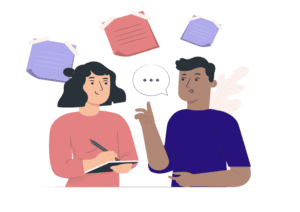
Monisha Holmes (She/Her) is a multi-talented model, writer, and psychotherapist dedicated to promoting mental wellness and exploring spirituality for personal growth. With a Master of Science degree in Social Work from Columbia University, Monisha addresses the complex challenges of today’s society. Her refreshing perspective on well-being can be found in publications like Cosmopolitan Magazine, TeenVogue, ShondaLand, and Bustle. Informed by Humanistic Psychology, she inspires self-care and personal development through a magical lens. Monisha’s dynamic background and commitment to holistic growth make her a powerful voice for authentic living.
In this exclusive Instagram Live interview, Monisha sits down with our founder to discuss some of the hottest topics around mental health and wellness that will undoubtedly empower you to deepen your self-awareness and emotional growth. Below are some highlights around what they discussed.
We Experience Different Types of Tiredness
Monisha brought to light the fact that we can experience different forms of tiredness. For example, anyone has experienced the fatigue of studying or working for too long, which can is cognitive tiredness. We also experience social / spiritual tiredness when we don’t get enough exposure to things that make us feel like we’re part of something bigger. An example of emotional fatigue is when therapists provide emotional support to their patients but feel second-hand trauma. Finally, we can experience mental fatigue through everyday functions such as driving and paying attention to something for too long.
To combat these types of fatigue, Monisha suggests getting in touch with our 5 senses to help us identify what type of tiredness we feel. In addition, she advises us to experience more mindfulness by becoming fully aware of each moment and making time to rest and breathe.
How Social Media can Help Us Self-Reflect
As an influencer and mental health advocate, Monisha knows how social media can bring up insecurities in us. Rather than avoiding those insecurities, Monisha proposes that technology and social media can be a “mirror” that can help us self-reflect and think about why we feel insecure. By exploring the insecurities that we feel from technology and social media usage, we can bring awareness to why we feel certain ways and start to question whether those insecurities are well-founded.
Practicing Boundaries and Mindfulness for Mental Health
Monisha is a huge advocate for practicing better boundaries as a way to protect our mental health. She says there is a difference between having respect versus giving compulsively to our own detriment because we have internalized that we’re not good enough. A great quote she mentioned is that “sometimes ‘no’ is the best word to help people.” Signs that can indicate you’re not practicing healthy boundaries can include when you’re calling yourself a ‘people-pleaser,’ when you notice you’re having a hard time managing your emotions, have a building sense of resentment, and/or experiencing chronic pain and aches.
She also advocates for practicing mindfulness as a way to enjoy each moment like drinking a coffee or taking a walk to work. Having points of enjoying your surroundings will make a difference in us being active participants in our own lives.
How Journaling can Help Combat Hustle Culture with Self-Compassion
Monisha thinks getting into the practice of writing in a journal is one of the best things for mental health. She suggests being flexible in your journaling practice to start, doing whatever works best for you. She says that journaling has changed the way she interacts with herself and has helped her be much more self-compassionate. In our prevalent ‘hustle-culture,’ it helped her forgive herself for not being productive all the time.
Journaling Helps us Reconnect to Our True Selves and Desires
Monisha says “journaling is one of the best ways to introduce ourselves to ourselves.” Many times, people are pushed onto paths that may not align with who they are or what they truly desire. As a result, people become numb to their true desires and who they are. Journaling gives our true selves and desires airtime and can help us see topics that repeatedly frustrate us which can shine a gateway to the solution and a true desire. For example, if you find yourself constantly journaling about not knowing how to budget, then it can indicate that budgeting is very important to you and will prompt you to look for solutions to help you get there.
“Journaling can give clues to what is important to ourselves because we’re giving ourselves permission to be honest with ourselves.”
Understanding Attachment Theory
One of the hottest topics around mental health right now is attachment theory which is the concept that our attachment to others is one of 4 types – anxious, avoidant, anxious-avoidant, and secure. It’s particularly popular right now, Monisha thinks, because we are all craving for love and belonging more than ever. Being one of the types other than secure can come with a number of issues that crop up in relationships. Monisha offers valuable insights into how we can better understand our own styles and suggests practicing affirmations such as “I am safe” and “I can share myself safely.”
Watch the Full Interview on our Instagram
While we’ve covered some of the highlights from the interview, be sure to watch the whole interview on our Instagram as they go into depth on some of the topics mentioned above. Whether you’re looking to get started in your journaling practice or just looking for great mental health tips, you’re sure to walk away with some gems. Check out the full interview recording on our Instagram page, @Emotewell.
